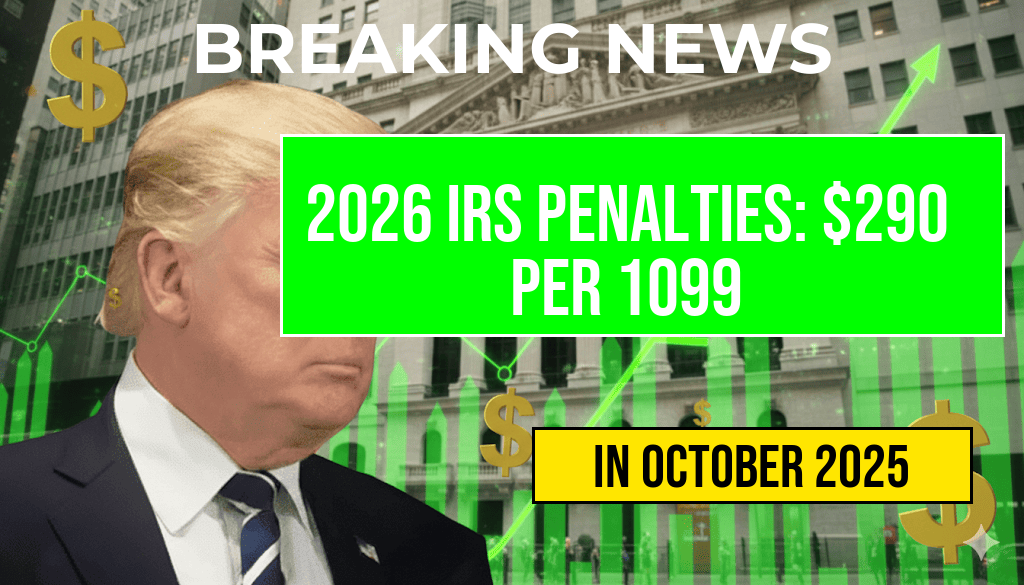Understanding 2026 IRS Penalties: Missing a 1099 Could Cost You $290 Per Form
A recent update from the Internal Revenue Service (IRS) underscores the financial risks for taxpayers and businesses that neglect to file or properly report Form 1099s. Starting in 2026, the IRS has increased penalties for failing to submit or accurately report these forms, with the potential for fines reaching **$290 per form**. This change aims to improve tax compliance, especially among gig workers, freelancers, and small businesses that frequently handle independent contractor payments.
While the penalties might seem straightforward, the implications are far-reaching. Missing a 1099 or submitting it late can lead to significant financial consequences, especially when multiplied across multiple forms. The IRS emphasizes strict enforcement of reporting requirements to ensure proper income disclosure and prevent tax evasion. As the filing deadlines approach for the upcoming tax season, understanding the nuances of these penalties becomes essential for anyone involved in issuing or receiving Form 1099.
What Are the New Penalties and When Do They Take Effect?
Effective starting in the 2026 tax year, the IRS has revised its penalty structure for incorrect or late filing of Form 1099. Previously, the maximum penalty per form was $290, but the updated regulation enforces this cap more rigidly, with a focus on increased enforcement measures. The new penalty rates are designed to deter willful neglect and improve overall compliance with reporting standards.
According to the IRS, the penalties are applied per form if the filer fails to:
- File the correct form by the deadline
- Provide accurate information
- Report all required payments
Failure to comply can lead to fines of up to **$290 per form**, with a maximum penalty for large-scale violations reaching into the thousands of dollars. The IRS also grants reduced penalties if violations are corrected voluntarily within a certain period, but deliberate or repeated neglect can result in the maximum fine.
Who Is Affected by These Penalties?
The updated penalties impact a broad spectrum of taxpayers, including:
- Freelancers and independent contractors receiving payments
- Small business owners issuing payments to vendors and contractors
- Financial institutions reporting interest and dividend income
- Rental property owners paying independent service providers
If you are responsible for issuing Form 1099-NEC or 1099-MISC, failing to submit these forms accurately and on time could be costly. Conversely, recipients of these forms should verify the accuracy of the data reported to avoid discrepancies that could trigger audits or penalties.
Steps to Avoid Penalties and Ensure Compliance
To mitigate risks associated with the new penalty thresholds, taxpayers and businesses should adopt diligent reporting practices. Here are some key strategies:
- Maintain accurate records: Keep detailed documentation of all payments made to independent contractors or vendors.
- Use reliable software: Employ IRS-approved accounting and tax reporting tools that facilitate correct form generation and timely filing.
- Meet deadlines: Be aware of the IRS filing deadlines—typically January 31 for the recipient copy and February 28 (or March 31 if filed electronically) for the IRS.
- Double-check information: Verify taxpayer identification numbers (TINs), names, and addresses before submitting forms.
- Seek professional assistance: Consult tax professionals to ensure compliance and avoid costly errors.
The IRS also encourages electronic filing, which reduces errors and accelerates processing, further helping taxpayers avoid penalties.
Potential Impact on Taxpayers and Businesses
The increased penalties for missing or incorrect 1099 filings could significantly affect small businesses and freelance workers. For instance, a business that issues 10 forms late or with errors could face fines of **up to $2,900** under the new rules. While some penalties can be reduced if mistakes are corrected promptly, the cumulative financial burden may influence how businesses approach year-end reporting.
Additionally, the heightened enforcement signals a push toward greater transparency, which could lead to more audits and scrutiny for those who neglect reporting obligations. Taxpayers should view these penalties as an incentive to prioritize compliance rather than an obstacle to avoid.
Resources and Further Reading
For more detailed guidance on IRS reporting requirements and penalties, consider consulting official IRS resources or reputable tax advisory websites. The IRS provides comprehensive instructions for Form 1099 [here](https://www.irs.gov/forms-pubs/about-form-1099), and recent updates on penalty structures can be found on their [official website](https://www.irs.gov/businesses/small-businesses-self-employed/penalties-for-failure-to-file-information-returns).
It’s also advisable to stay informed through trusted financial news outlets such as [Forbes](https://www.forbes.com) or educational platforms like [Wikipedia](https://en.wikipedia.org/wiki/Tax_compliance_in_the_United_States).
Key Takeaways
| Penalty Amount | Per Form | Applicable When |
|---|---|---|
| Maximum Penalty | $290 | For intentional disregard or significant errors |
| Reduced Penalty | Lower amounts possible | If errors are corrected voluntarily within specified timeframes |
As the 2026 tax season approaches, understanding these changes becomes critical for anyone responsible for filing or receiving Form 1099. Proper compliance not only avoids hefty fines but also promotes transparency and integrity in financial reporting.
Frequently Asked Questions
Question
What is the penalty for missing a 1099 form submission in 2026?
Answer
The IRS may impose a penalty of up to $290 per form for missing or incorrect 1099 reporting in 2026.
Question
Who is responsible for filing 1099 forms?
Answer
Businesses and payers are responsible for filing 1099 forms to report payments made to independent contractors, freelancers, and other entities.
Question
What are the common consequences of not filing 1099 forms on time?
Answer
Besides the $290 per form penalty, failing to file 1099 forms on time can lead to additional penalties, audits, and potential legal issues with the IRS.
Question
Are there any exceptions or relief options for 1099 reporting penalties?
Answer
Yes, in certain cases, the IRS may offer penalty relief or exceptions if you can demonstrate reasonable cause or correct the mistake promptly.
Question
When is the deadline for filing 1099 forms in 2026?
Answer
The deadline for filing 1099 forms with the IRS is typically January 31, 2026, for paper and electronic submissions, but always verify the specific year’s deadlines.









